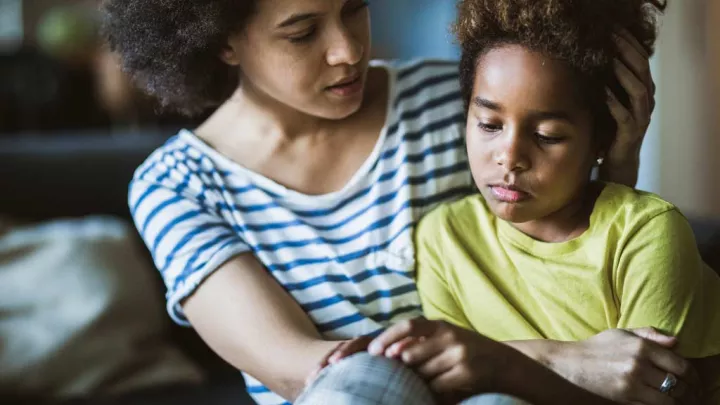
How to Talk to Kids About Death
It’s natural for grown-ups to want to protect children from bad experiences. However, all children, at some point, will experience the death of a loved one, friend or even a public figure they admire. Parents and caregivers should explain death in simple, straightforward terms and ensure that kids have lots of opportunities to talk about their feelings.
When someone dies, “kids generally want to talk about it; they want to engage parents in conversation. They want to understand it,” says David Schonfeld, MD, Director of the National Center for School Crisis and Bereavement at Children’s Hospital Los Angeles. He adds that even very young children can understand death. “Research suggests that most children come to understand the concepts of death by 5 to 7 years of age; children at even younger ages can also understand death, especially after experiencing a personal loss.”
When talking to children about the death of someone familiar, whether it’s a grandparent or a favorite sports hero, adults should focus on understanding how the child feels about the death and helping the child cope with those feelings.
“For children to be able to cope and adjust to a death, they really need to understand what death means,” says Dr. Schonfeld.
Four important concepts to remember
Here are four key concepts about death that are vital for kids of any age to understand.
1. Children need to know that when people die, they don’t come back to life. It’s important to speak in clear, simple terms when explaining that death is permanent.
“We tend to make comments like, the person has ‘gone far away’ or is ‘up on the clouds,” which suggests the person will return,” says Dr. Schonfeld. “So, children may wait for the person to return or resent it when the person doesn’t return. They need to understand it’s irreversible so they can begin the mourning process.”
Dr. Schonfeld says that for very young kids using the phrase “all gone,” can help them understand that the person will not come back.
2. Make sure children understand that after death all life functions stop working completely; the person’s body is not working anymore and the person doesn’t think or feel. Otherwise, children may worry that the person who died is still in pain or sad.
Dr. Schonfeld suggests explaining to children, “’When a person dies, his or her body stops working and it doesn’t start working again. So, the person doesn’t feel pain, is not hungry, is not scared.’ You can state it very simply.”
3. Children need to understand that all living things eventually die.
When talking to children about death, Dr. Schonfeld says it’s tempting for a parent to say “Oh, I’ll never die” or “I’ll always be there,” but that can lead to confusion for kids. “If kids think that some people are immortal, it may mean that people who do die were chosen to die perhaps because they did something wrong.”
Teaching kids that all living creatures die is something that can be broached easily in nature. “Kids see examples [of death] all the time, like if you find a dead bird or there’s a spider that dies,” says Dr. Schonfeld. These are opportunities in everyday life to discuss the basic concepts of death with kids in a way that shows it’s a part of the lifecycle, and it can be done before they experience any personal loss.
4. While it’s not necessary to share too many details of a person’s death, providing children with an explanation of how or why a person died will make it less likely for kids to feel scared or guilty.
“Kids need an understanding of the physical reason why someone died,” says Dr. Schonfeld. “Guilt is also an extremely common reaction to loss. Kids may think, ‘I did something wrong and that’s why someone I loved died. Then that means I can just never do that again, and it shouldn’t happen again.’”
Although children may not say they feel guilty, Dr. Schonfeld advises that it’s a good idea to address that feeling when talking about death. “I always presume the guilt may be there, so I reassure children that there wasn’t anything that they should have done or could have done that would have changed the outcome.”
General tips:
- Speak clearly and plainly to kids. Don’t use euphemisms.
- “It’s important that we use simple terminology and avoid jargon,” says Dr. Schonfeld. “The only reason that some expressions are felt to be comforting is they don’t really address what’s happened. But that’s just confusing for kids.”
- Check back in with children to see if you’ve been clear; ask the child what he or she has understood about what you’ve said.
- Ask children how they feel.
- Give them many opportunities to talk about their emotions and different ways to express themselves, such as through drawing or painting.
- Allow children to have their feelings.
- “There is a tendency to try to cheer people up when they are grieving,” says Dr. Schonfeld. “When people witness grief, it makes them uncomfortable, so they want the person to stop demonstrating their distress. But we can’t really help kids cope if we don’t give them permission to express those feelings.”
- Model ways to cope with grief.
- “Allow your child to own their feelings, and then share a little bit about your feelings and how you have coped with loss,” advises Dr. Schonfeld. “You can say, ‘I remember hearing about this [death or tragedy] and I felt very [sad]. What I did was I talked to your mom about it and that made me feel better.’
“You’re sharing coping strategies like talking to people you care about or remembering a positive memory of the person who died,” says Dr. Schonfeld. “We need to demonstrate that we have the same authentic feelings and show kids some of the strategies we use to cope with those feelings.”
- “Allow your child to own their feelings, and then share a little bit about your feelings and how you have coped with loss,” advises Dr. Schonfeld. “You can say, ‘I remember hearing about this [death or tragedy] and I felt very [sad]. What I did was I talked to your mom about it and that made me feel better.’
- Understand that every child grieves differently.
- Young children don’t sustain intense feelings of grief for long periods, so they may cry or yell, then go play. This is typical for grieving children.
- Teenagers may express grief as sadness or anger. This is also quite common.
- Teens still need to be parented.
- Teens tend to turn to their peers to talk about important topics—but during challenging times like grieving a death, teens really do need parent presence and discussion.
“They may be reluctant to talk about it because it’s uncomfortable, or they may not want to burden their parents by upsetting them and raising the topic,” says Dr. Schonfeld. “But they still need an explanation of what happened, and support.” - Dr. Schonfeld also advises parents not to forget that teenagers are still children; although they are more mature and responsible than younger kids, adolescents should not be the primary support system for grieving parents. “Adults need to look for outside support for themselves,” says Dr. Schonfeld.
- Teens tend to turn to their peers to talk about important topics—but during challenging times like grieving a death, teens really do need parent presence and discussion.
- Grief changes over time.
- “When someone dies, you lose that person and that is the primary loss. But you also lose everything the person could have done or might have done for you in the future; those are all the secondary losses,” says Dr. Schonfeld. “Young kids who lose someone significant don’t appreciate the secondary losses right away. As they get older, kids grow into realizing all that they have lost. That’s relevant because it doesn’t matter how well you explain [a death] to a child at age 5 or 10, there will be more questions when they are older, 15, 20 or 25.”


